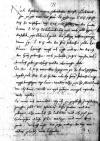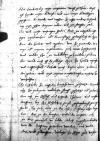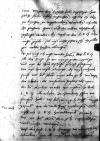Letter #4223
Stanisław KOSTKA to Ioannes DANTISCUSMarienburg (Malbork), 1533-11-24
| received 1533-11-25 Manuscript sources:
Auxiliary sources:
Prints:
| ||||||||
Text & apparatus & commentary Plain text Text & commentary Text & apparatus
Dem hochwirdigstenn n Got Vater und herrn herrn
Noch befelens meyner geburlichen dyenste. /
Hochwirdiger n Got Vater und Herrr. /
Es gybt myr Ewer Virdige Gnaden schrifftlich zu vorstehen, / wy XXX marck geldes, / von der contribution Ewer Virdige Gnaden zukommende, / bey myr noch solde hynderstellik seyn bleben, / begeret der selbtigen underrichtunge, weme sy, / Ewer Virdige Gnaden ader den herrn poborczen, / solden zukommen. / Hyrauff weyss ich nicht anders, / den das ich den herrn poborczen noch ynhaldt yrher register volkomlich gelt / gentzlich widder uberreicht habe. /
So dan Ewer Virdige Gnaden vormuttet hyrynne yr zu korcz gescheen, begibt sich, das Ewer Virdige Gnaden, / wo och dy herrn poborczen / auff negst konfftigen 1533-12-13⌊tag Luciae1533-12-13⌋ / werden, alhy seyn zu
Es wirt och vormeldet, wy ich yn geystliche Iurisdiction greyffen solde, / von pfarrernn busze furdere / und denselbtigen / alze nemlich zu Lubdowo unnd och sust ym Golauschen etliche huben entczoge / und myr czueygente. / Vorhoff nicht, das sichs anders, / den wy von alders gehalden, / wirt befynden.
Hot Brochotzky, meyn amptman, wass gethon, / dass yss hynder meym bewust / unnd ane meyn bewilligen gescheen, / do werde wol wissen, / zo ichs anders befynde, wy myt yhm dorynne reden unnd yn stroffen sal. So wil nicht vorpurgen haben, das yn negstkonfftiger mythwochen ader donnerstagen gewiszlich von hynken der
Dy schtocke, zo auff den kirchhowen gesatzt, / seyndt nhy zu yrkeyner weltlichn straff gesatczt ader gebrauchen, den ich ym schloss und schtadt thorme und aussen dorffern bey den scholczen sunst gefengknysz genug habe. / Es sich aber yn der ersten Lutherey alzo begeben, / das yn den kirchen / under den ampten / och yn das gemehel und bilder etlich ungestumikeyten von der Lutherey getriben worden / och under das volk geworffen, / welchs zo de
<m>
yn Got vorstorbnem
Es sal mich och nicht wunder habenn, das Ewer Virdige Gnaden alle dasjenige, / zo von myr yn gutter meynunge unnd myt des herrn bischoffs geheysz gescheennn, von myr vor argk annympt, / dy weyl mich och sunst vor
Wasz aber sunst Ewer Virdige Gnaden czweyunge von myr sich teth beduncken, / habe alle meyne tage keyn ursach gebenn och zu czweyunge / vorursachen mich gehutt und vorhutten wil, / weyss aber solchs Ewer Virdige Gnaden hefftigens widder mich setzens / ursachen nicht zu ermeszen, / musz es
Datum



